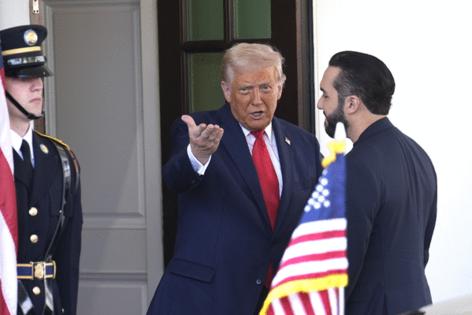Confusion grips Big Tech over exemptions from Trump tariffs
Published in News & Features
WASHINGTON — American technology companies hoping for relief from President Trump's trade war with China grappled with further uncertainty Monday, left to decipher whether a government policy exempting businesses that are core to the U.S. economy from crippling tariffs could be relied upon.
An industry that plans product launches and manufacturing years in advance faced four days of vacillation from the White House, which appeared torn over how much assistance to provide U.S. companies that make the nation's smartphones and watches, computers, tablets and semiconductors.
Within the administration, concern had begun to percolate over projected price increases for popular American products, such as the iPhone, which analysts said could triple in cost if Apple were forced in a trade war to manufacture the devices at home. An announcement Friday, exempting technology products from most of Trump's tariff hike of 145% on imports from China, was meant to buy companies time to prepare, according to an official familiar with the matter.
But it also reinforced a reliance on Chinese manufacturing that has driven Trump's aggressive trade policies in the first place, prompting him to vow, in one form or another, to onshore some of the industry's most complicated supply chains.
The result was a temporary rally Monday for tech stocks on Wall Street, followed by a whimper and a second rebound by the closing bell — yet another day of turbulence in markets that have come to react to the president's every word on tariff policy.
"Look, I'm a very flexible person," Trump told reporters Monday when asked about exemptions. "I don't change my mind, but I'm flexible."
The president said he had agreed to give assistance to Apple after speaking with its chief executive, Tim Cook. He also said he would provide temporary relief to automakers that need time to adjust to the coming tariffs, leading stocks for car companies to soar.
"There will be, maybe, things coming up," Trump said. "I speak to Tim Cook. I helped Tim Cook recently, and that whole business. I don't want to hurt anybody. But the end result is we're going to get to a position of greatness for our country."
Exempt, for now
Guidance from U.S. Customs and Border Protection on Friday evening came as welcome news in Silicon Valley: Major technology products would be exempt from the 125% levy against Beijing in what Trump calls "reciprocal" tariffs. The term is generally understood to mean charging an equal rate on imports as the other nation charges on exports. But Trump is imposing higher rates.
But the White House quickly tempered expectations around that exemption the next morning, with Peter Navarro, a counselor to the president, saying that "the policy is no exemptions, no exclusions," and with the president's commerce secretary, Howard Lutnick, saying in an interview that tariffs on technology products would come within "a month or two" through a different mechanism.
"They're exempt from the reciprocal tariffs, but they're included in the semiconductor tariffs, which are coming in probably a month or two," Lutnick said. "These are things that are national security that we need to be made in America."
The White House communications office emailed out Lutnick's remarks to the news media, amplifying his message, before Trump weighed in on social media.
"NOBODY is getting 'off the hook' for the unfair Trade Balances, and Non Monetary Tariff Barriers, that other Countries have used against us, especially not China which, by far, treats us the worst!" the president wrote. "There was no Tariff 'exception' announced on Friday. These products are subject to the existing 20% Fentanyl Tariffs, and they are just moving to a different Tariff 'bucket.'"
Signs emerged Monday of what that "bucket" would entail when the Trump administration moved to open national security investigations into the import of computer chips — an inquiry that could serve as a pretext for new tariffs on the products.
Amid confusion over the policy, the New York Times reported Sunday that China had suspended the export of rare earth minerals that are crucial to the manufacturing of electrical components for computer chips used in smartphones, among a host of other products, including cars and missiles.
Courting Trump's favor
In an overture to Trump, Apple's Cook had committed in February to spend $500 billion on manufacturing and engineering in the United States over the next four years. Still, within Apple and other Big Tech companies, fears persist over the duration of the tariff exemptions — and how to proceed with product planning when the Trump administration, at any given moment and at the president's whim, might change its mind.
Another California-based company, Nvidia, announced Monday that it would begin manufacturing chips and supercomputers in the United States for the first time — a development that was promptly promoted by the president from the Oval Office.
"The engines of the world's AI infrastructure are being built in the United States for the first time," Jensen Huang, founder and chief executive of Nvidia, said in a news release. "Adding American manufacturing helps us better meet the incredible and growing demand for AI chips and supercomputers, strengthens our supply chain and boosts our resiliency."
Aaron Klein, a senior fellow in economic studies at the Brookings Institution, said it would be a challenge for technology firms — or any business — to respond coherently to a policy that he called "nonsensical."
"Rational economics is ill-suited to respond to how Trump is behaving," Klein said. "The tariffs appear to be designed to maximize Trump's personal leverage over the largest companies on Earth, and make Trump the epicenter of all global news, so that markets and society are hanging on his every word."
"All these tech firms are acting shocked," he added, "that the president is going through with what he has been promising to do his whole career."
_____
©2025 Los Angeles Times. Visit latimes.com. Distributed by Tribune Content Agency, LLC.







Comments